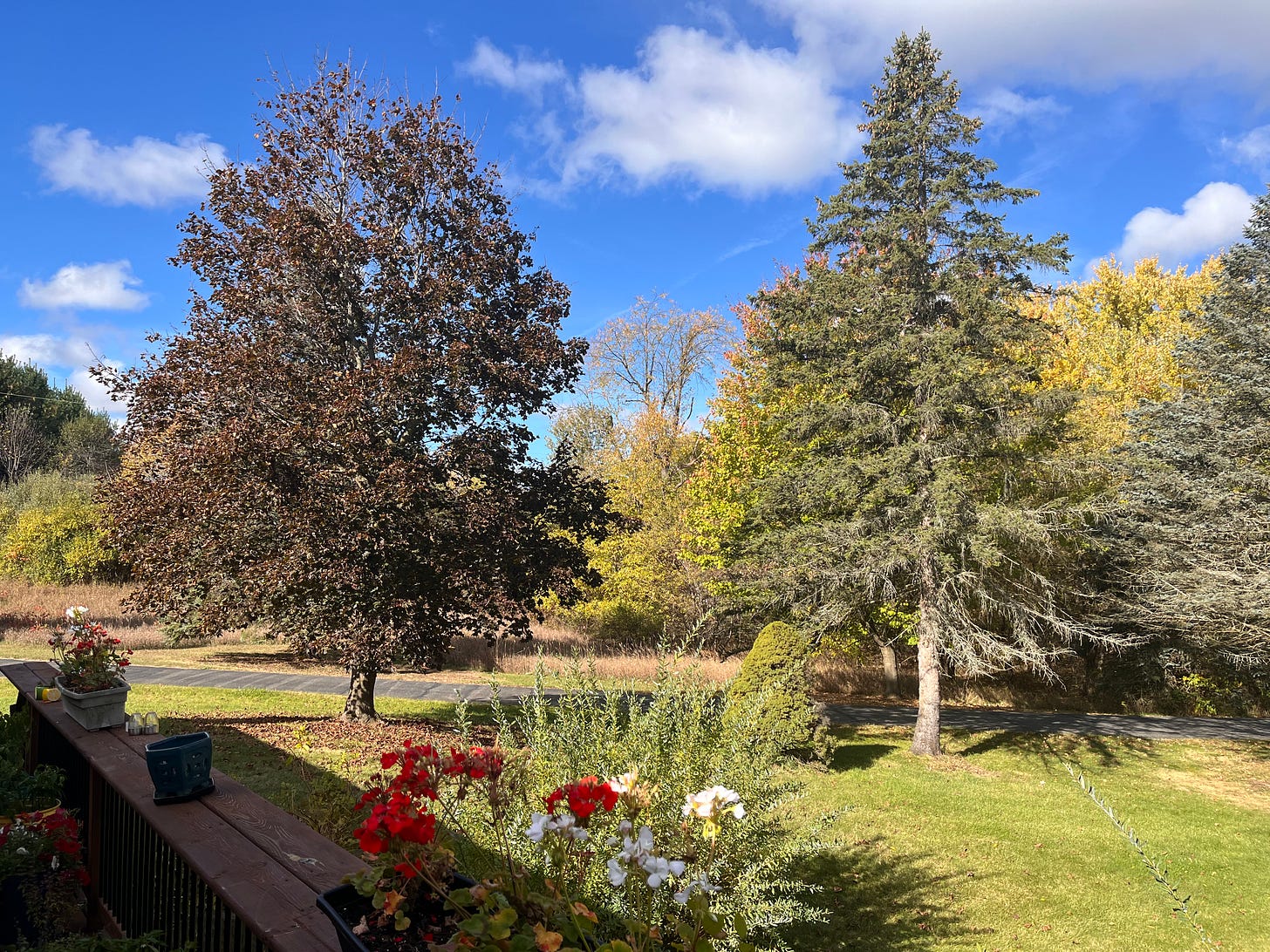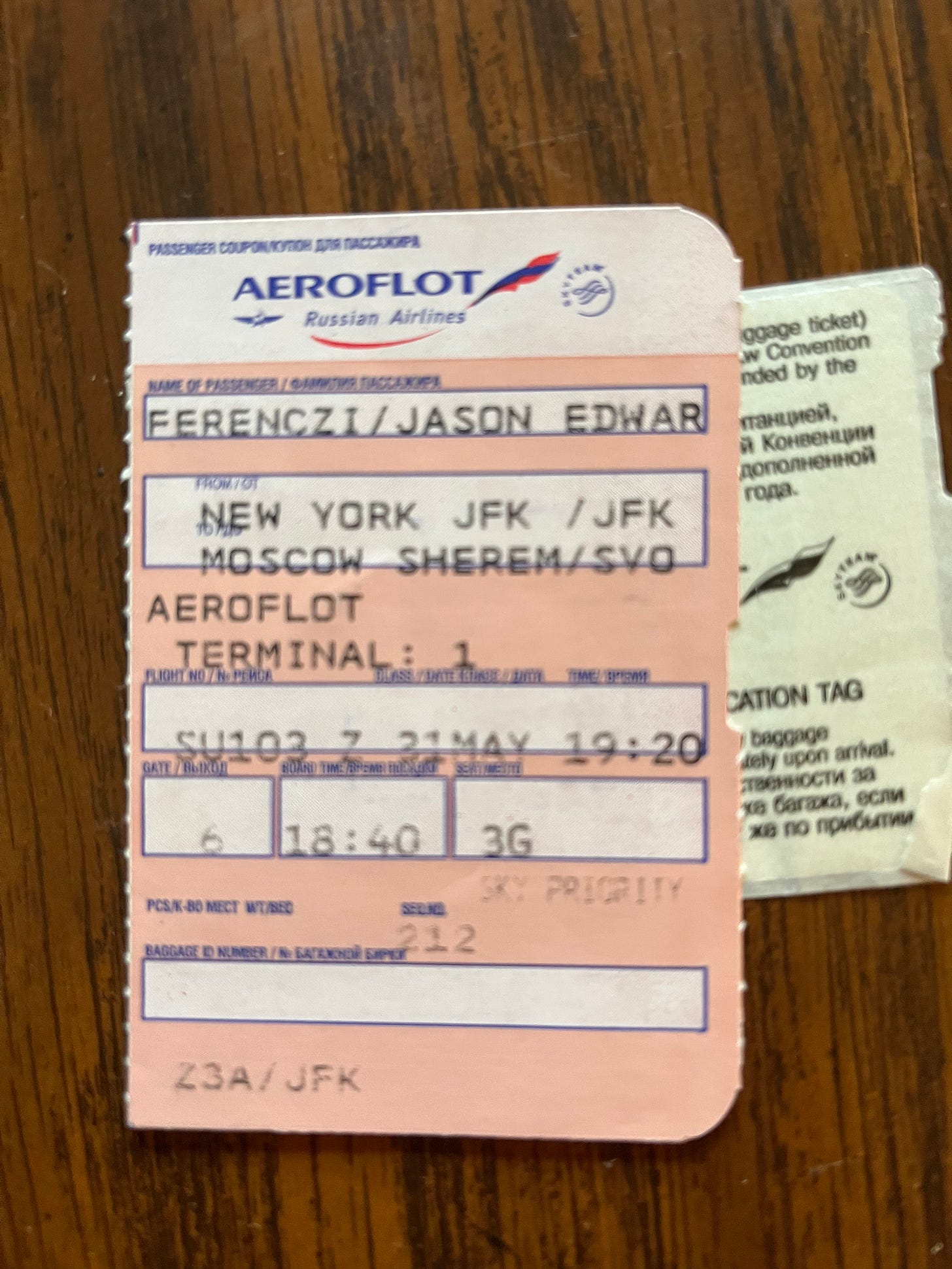I’ve been silent in this space longer than I’d planned. Life has been a bit topsy-turvy lately (more on that below). I’m grateful for a season where I’ve been able to slow down and be more reflective.
The days continue to shorten here in West Michigan. The trees in the woods outside change color and shed their leaves. Slowing down for me means paying more attention to the way the branches of my favorite maple become more visible each day, or noticing the shift in the quality of light as the angles of the sun become more wintry.
I find myself digging into questions of how I “see” in deeper ways, too. How do I see and understand what is happening around me? Both the micro-changes in my immediate environment and the macro-changes in the broader world?
How do I see? And how do I fail to see?
In my last post, I focused on how we often get caught up in the superficial story, missing the deeper story that needs to tell itself.
I want to take this same theme in a slightly different direction, reflecting on how hard it can be to name and understand what is happening around me.
A flutter of paper
A couple of weeks ago, I was searching through a drawer, looking for something I hadn’t used in a number of years. I pulled out a wallet I often carry with me in my travels. Out of it fluttered a small square of paper.
That paper was a boarding pass for an Aeroflot Russian Airlines flight from New York JFK to Moscow in May 2019. It displays my SkyTeam priority status, as Aeroflot was then a part of the same global alliance as Delta.
I sat there in the autumn sun a bit stunned by how much the world had changed in five years.
A Russian journey
That May 2019 trip was both professional and personal. I spent a week working, followed by a week of personal “pilgrimage.” I retraced steps. Visited places sacred to me. Tried to sort out some complex memories. Sat with friends.
My journey with Russia goes back to my childhood. My journeys to Russia began in 1996. I spent the better part of two years there from 1996-1998.
I was young and idealistic. And those were idealistic times. It seemed the world was coming together in unprecedented ways and the future would be more peaceful, connected, and prosperous.
The Russia I came to know in those years was a wounded nation trying to find its place in a world where it lacked the power and prestige it once had. Many of the older people I met were stunned or angry (though almost always curious and polite to a foreigner). Most younger people tended to look uncritically and imitatively to the West. I remember so many conversations with young people who were confused about why I was there. Some assumed I was looking for ways to make money (many, many westerners were). I remember well a close Russian friend telling me “It seems a bit crazy, your interest in our dusty language, literature, and history. What good is that?” I’ll never forget his use of the word “dusty.”
I returned to Russia many times over the years, right up to that “last” visit in 2019. I saw the country change, the tenor of conversations shift. Confusion and imitation gave way to anger and uncritical pride, at least for some. The space for conversation narrowed, even if it never closed completely.
It was hard for me to accept those changes, the hardening of defensive cultural values. Looking back, I recognize that I clung to a certain romantic notion of Russia that had shaped me in fundamental ways. It was hard to let that go.
I could see the change and the deep continuities of those defensive cultural values with earlier eras of Russian history. It was unmissable. But I couldn’t fully metabolize it. I couldn’t make sense of it within the framework of my life.
A Ukrainian journey and growing dissonance
From 2000-2020, I spent more time in Ukraine than in Russia. In the years when I first traveled in Ukraine, I didn’t see it as a fundamentally different cultural space. Indeed, many things bound the two nations. I tended to move most in circles and parts of the country where people spoke Russian. I own now that I bought into untruths that had been contributing to the erasure of Ukrainian identity since the eighteenth century.
2014 changed that, at least in part. The creepy Russian seizure of familiar parts of Ukraine was shocking yet hard to fully digest. I focused my attention on the resilience of the Ukrainian people and the incredible emerging power of Ukrainian civil society. I made fumbling attempts to speak more Ukrainian. I asked Ukrainian friends about their family roots. I read Ukrainian history written by Ukrainians.
But I still couldn’t see clearly, even if I perhaps felt more clearly and knew more. Questions always lurked just below the surface. I sensed their presence. But it always seemed just a bit too hard to name. I wasn’t brave enough to face them.
It wasn’t until I was watching the full-scale invasion of Ukraine in February 2022 that the story felt clear, almost inevitable. Others, including brave Russians, had told that story in clear ways (1). Ukrainian friends did their best to help me see (and to see themselves).
Yet somehow, over two decades of rich experience, I didn’t see. Or I didn’t see as clearly or fully as I should have.
I don’t say this with a spirit of self-flagellation. That helps no one. I say it rather with a spirit of curiosity. How is it that I / we so often fail to see until it’s too late?
Recognizing dissonance, noticing feelings, and having the courage to act
I wish that this geopolitical-level story were the only experience where I’d experienced dissonance, felt that something was askew, and yet lacked the courage to act.
It isn’t.
I see so many stories throughout my professional career (and beyond) that demonstrate a similar failure, unwillingness, or inability to see and name. I have seen this especially in the life of many organizations and the unwillingness to name unspoken agreements that hold destructive patterns in place (more on that in a future post).
All these stories share the dynamic of fear.
Fear of having to admit that I don’t really understand.
Fear of what might need to change.
Fear of losing something: comfort, privilege, position, recognition.
Fear of hard conversations and having to say I’m sorry.
It gives me (weird?) comfort to hear others tell similar stories. I know I’m not alone. I sense sometimes that we live in an age of collective failure to see.
I find myself asking myself daily what do I need to do? Where do I need to be bolder?
I have far to go. I’m not alone. I’m so glad I’m not alone.
A Transition
2024 has been a year of professional dissonance.
It’s been at the same time the best and the worst of times.
I’ve done some of my best work this year. I’ve created space for leaders to grapple with their own complex stories and their hopes and fears. I’ve learned so much. I’ve been stretched in my role as a designer of learning, teacher, and facilitator in unprecedented, exciting, and fun ways. I’ve experienced so many beautiful relationships and resonances with some fabulous people from around the world. It’s been a great year.
And yet, it’s been increasingly clear that I’ve not been in an organizational container that couldn’t hold that goodness and allow it to flourish. I’ve known that for a long time, even if it felt too hard and scary to name. In late September, I left unRival. Recognizing that unRival is not the right organizational container is in no way a negative statement about them. There’s much good there. I gave much and I gained much, and I’m very, very grateful.
But sometimes things don’t fit. And you can’t make them fit. And naming that is hard.
I’m glad that the dissonance has been named. I felt more able to breathe once those hard words had been spoken and decisions made.
New possibilities suddenly opened that I couldn’t see before.
What Next?
One of the chief lessons I’ve learned in the past few years is the power of spaciousness: in program design, in facilitation, in my approach to the flow of a day.
Spaciousness, perhaps as much as anything, allows us to see, feel, and notice what is truly happening around us. Spaciousness makes it less likely that we’ll miss the big story and the ways the world is changing.
I’m grateful to be part of a number of initiatives that are exploring how we can bring greater spaciousness to the work of social change:
How can we better contend individually and collectively with the stories that have shaped us and draw on the power of these stories in meeting the present moment?
How can we care for one another’s wellbeing and see this care as critical to all we seek to accomplish?
How can we access the power of creativity in seeing new possibilities?
How can we better organize in a way that prioritizes care?
Perhaps most deeply, how can we better see one another across the things that divide us? How can we imagine ourselves in community with those most different from us?
I’m focusing this fall on some ongoing coaching relationships. I do love coaching work – asking good questions, listening well, and helping people to see themselves a bit more clearly. I apologized recently to one of my clients when I sent the invoice, as I feel like I gain as much from our sessions as they do. I love that work.
I’m also grateful for some other consulting work that is causing me to reflect more deeply on many of these beautiful questions in the company of some very good people.
I am fortunate to have space to think carefully about the future. I’m deeply grateful for that.
Above all, I want to make full use of that space to see well.
Questions to Consider
As you reflect on your own story, what are some things you’ve had difficulty seeing, metabolizing, and accepting?
Are there things you sense you might be missing today? What feels risky in naming those?
If something here resonates with you, let’s talk. I love curious conversations and possibilities.
***
(1) There such a wealth of resources out there that contribute to an understanding of the last 30+ years of Russian history. I heartily recommend several works on Russia by Peter Pomerantsev, Masha Gessen, Arkady Ostrovsky, and Ivan Krastev and Stephen Holmes. All of these predate the brutal and ongoing full-scale invasion of Ukraine in February 2022. I also deeply appreciate Timothy Snyder’s work On Tyranny which brings so much historical understanding of the twentieth-century into a short, accessible aid to understanding and living in our current world.



